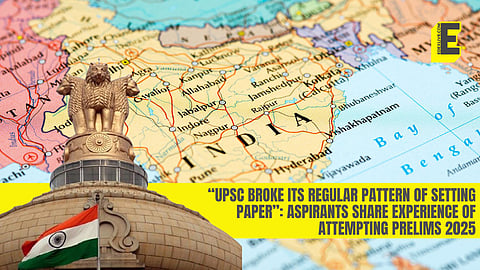
- News
- Campus
- Exam
- Podcast
- Web Stories
- Do You Know
- Path Finders - UG Programs
- Videos
- Book Review

The Union Public Service Commission (UPSC) successfully conducted the Civil Service Prelims 2025 exams on Sunday, May 25. The exam was held in two shifts across the nation in various centres.
The prelims consist of two objective-type papers, each worth 200 marks. Paper 1 tests your knowledge on topics from history, economy, polity, geography, environment, and science & technology, and Paper 2, Civil Services Aptitude Test (CSAT), evaluates one on the basis of comprehension, logical reasoning, and analytical skills.
General Studies, Paper 1, was conducted from 9.30 am to 11.30 am, and Paper 2, CSAT, was held from 2.30 pm to 4.30 pm. Each paper is two hours long, and CSAT requires a minimum qualifying score of 33%.
Aspirants opined that this year’s paper was lengthy and moderately difficult.
“Paper 1 was challenging, but I was able to attempt it. I faced difficulty in attempting Paper 2,” says Gurdith Singh from Amritsar, Punjab and Shivani Suresh from Kochi, Kerala, shares, “Paper 1 was more difficult than Paper 2.”
On the other hand, Avidi Goutham Chandra from Warangal, Telangana, thought both the papers were moderate, neither too difficult nor too easy.
Gurudith, being a first-time aspirant, had an overall positive experience with the Civil Service Exam.
As a second-time aspirant, Goutham, who was expecting a more difficult paper, found this year’s question paper to be moderate but relatively more challenging than last year’s. He notes that the question paper had an innovative approach to framing questions. Regular topics were asked in a three-statement format, and the options were made tricky and lengthy to comprehend.
Shivani, who was also a first-time candidate, adds that UPSC tried to break free from their regular trend and adopted a new style of setting the paper. She adds that while Paper 1 had more current affairs-related questions than static questions, Paper 2 avoided the usual calendar Math questions and adopted family tree-related questions.
“The pattern of framing the options came as a surprise, as they were a bit confusing for the students to understand,” said another UPSC aspirant, on the condition of anonymity, who was attempting for the third time.
When asked about the most challenging part of their journey, Goutham answers, “The biggest challenge was to figure out what to read and how much to read. So, I went through the question papers from previous years.”
Gurudith replies, “The most challenging part was to push myself daily to work hard, especially since the exam itself is very unpredictable.”
Adding that one tends to have self-doubts and the pressure increases every day, but the hope to clear the exam has kept him motivated. As Shivani shares her journey, she mentions that it is hard to maintain consistency, and she believes that the habit of learning new things and gaining knowledge is more important than focusing on the results.
Upon asking which section they found more tough, Gotham said that he felt the science and technology section was specifically difficult for him. Shivani expresses that economics was the challenging part for her as academically, she does not come from an economic background. “The new question models and the lengthy CSAT paper made it even tougher,” says another aspirant from Visakhapatnam.
As advice to the new aspirants, Goutham warns them to be aware of the coaching scams because no coaching institute can guarantee success. He also adds that one should develop an attitude of accepting failures and learn from them.
The candidate from Visakhapatnam offers her insights as she suggests that aspirants avoid predicting the paper and be ready for the surprise factor. While she goes on to add that it is a long process and it will take time to achieve the goal, she also requests the aspirants not to make UPSC their sole purpose.
Lastly, Shivani insists that the upcoming UPSC aspirants maintain consistency while preparing for the exams.
